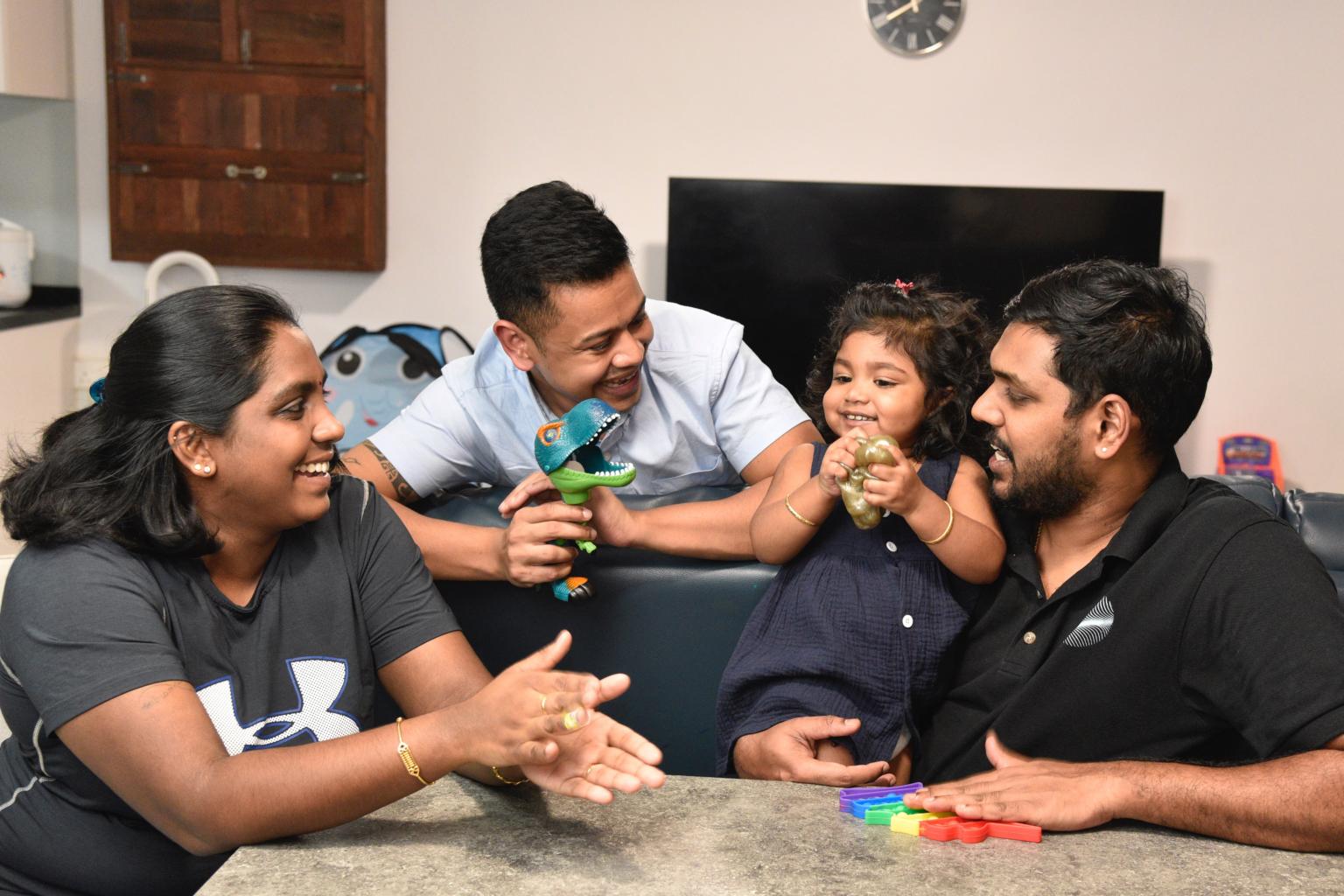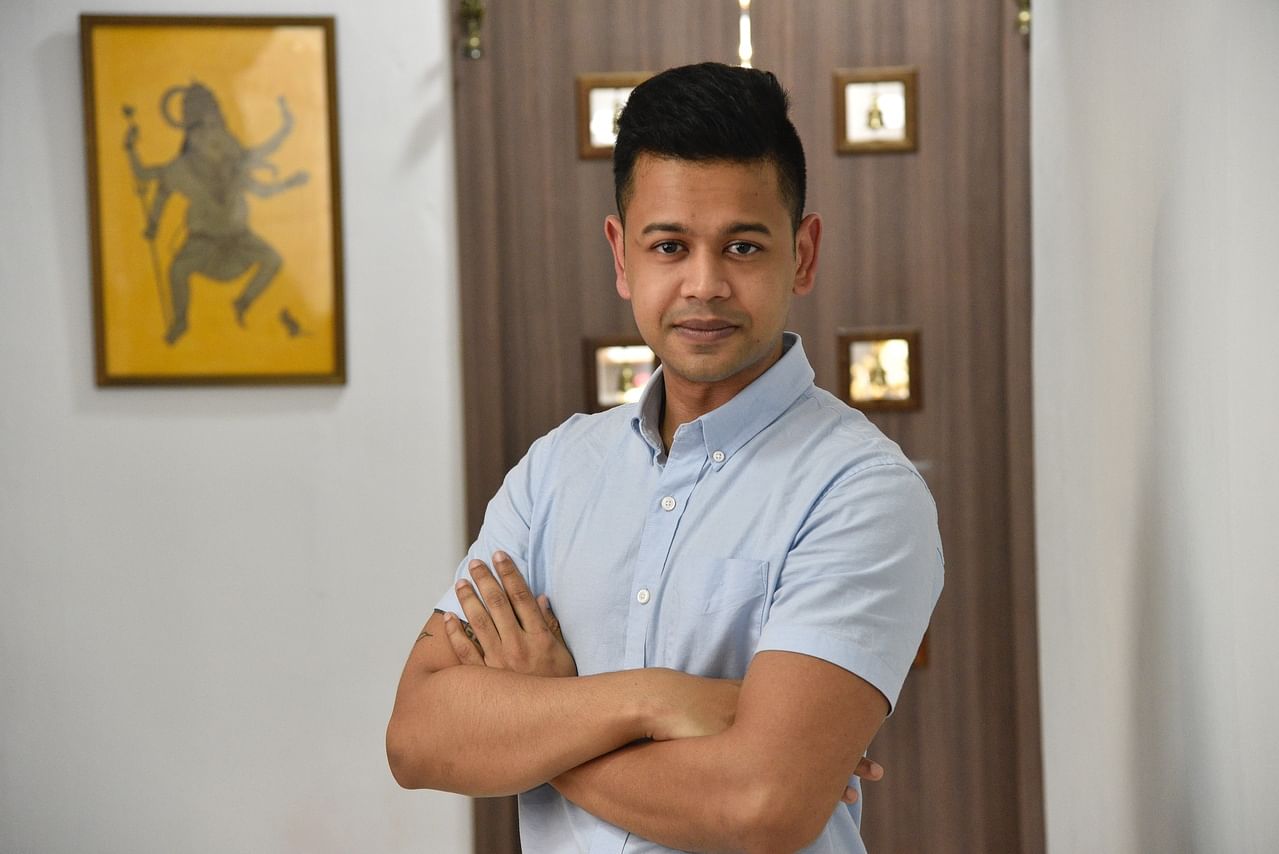Organ donor in S'pore answers online plea, donates 23% of liver to baby he never met
Sign up now: Get ST's newsletters delivered to your inbox

Mr Sakthibalan Balathandautham (in light blue shirt) donated part of his liver to Rheya.
ST PHOTO: DESMOND WEE
Follow topic:
SINGAPORE - While checking his Instagram messages in July 2020, sales executive Sakthibalan Balathandautham came across a plea by a young couple looking for a liver donor for their 1-year-old daughter, Rheya.
Over the next three hours, he could not stop thinking about the toddler.
At about 1am, the 28-year-old contacted the couple, and offered to be a donor.
They talked on the phone and Mr Sakthibalan, who is single, said he wanted to help the family.
"A life was at stake. I knew I wanted to go ahead with it if I turned out to be a match.
"I was worried about undergoing the procedure and my recovery process, but after reading up on how transplant surgeries are conducted, I decided I could handle it."
Rheya was born in July 2019, the first child of Mr Sunil Jayakumar, 31, and Ms Ruthra Saravanan, 30.
The couple celebrated the new addition to their family but their happiness was short-lived, as Rheya developed persistent jaundice in her first month.
When her condition did not improve, she was referred to the National University Hospital (NUH).
There, the doctors diagnosed her with biliary atresia - a rare disease in infants where the bile ducts in the liver are inflamed, blocking bile flow to the gallbladder.
It eventually leads to liver failure.
The doctors suggested a surgical procedure to restore bile flow from the liver to the intestines. Despite their anxiety over how she would fare in surgery, Mr Sunil and Ms Ruthra hoped the procedure would help Rheya, and she underwent her first surgery at NUH when she was 40 days old.
"As parents, we felt anxious and sad seeing surgical tubes attached all over her body for a 10-hour surgery. While we were at the hospital, I saw older children with Rheya's condition coming in for their routine check-ups.
"I thought Rheya could grow up normally to be like them if the procedure worked, but it turned out differently," said Ms Ruthra, a civil servant.
Despite the surgery, Rheya's bile flow was still not enough. She needed a liver transplant.
As Mr Sunil and Rheya had the same blood group, he stepped up to be her donor in January 2020.
But after losing about 12kg and adhering to a strict diet and exercise regime for six months to prepare for the surgery, Mr Sunil, a lab executive, was told he was not a suitable match for Rheya.
"I always believed I would be a match for Rheya. When I realised I could not donate my liver, that was the first moment I felt helpless and lost. Almost immediately, we started to reach out to our friends and contacts to find a donor," he said.
Finding a liver donor was a difficult process as the individual needed to be healthy, with no medical problems, at least 21 and younger than 55.
As many of their immediate family and friends did not share Rheya's blood group, and some were stuck overseas due to the pandemic, the couple posted a plea for a suitable liver donor on social media.
Their friends and family helped spread the word in the community, as did some local celebrities who aired interviews with the couple. Within three weeks, 99 people expressed interest in donating a part of their liver.
After consulting with NUH staff, Mr Sunil shortlisted 10 potential donors based on their medical records and lifestyle habits.
Mr Sakthibalan passed the donor suitability test, and underwent reviews and assessments before an interview with an ethics committee.

Mr Sakthibalan donated 23 per cent of his liver.
PHOTO: ST
He was told about the risks involved and asked why he had offered to be a donor.
Mr Sakthibalan received encouragement from his employer, who gave him time-off to attend tests, assessments and recover from the surgery.
Mr Sunil and Ms Ruthra did not know who the final selected donor was as his identity was kept confidential unless he chose to contact them.
On Sept 30 last year, Mr Sakthibalan and Rheya underwent the respective procedures. Mr Sakthibalan donated 23 per cent of his liver.
Rheya began a slow and steady recovery process, which include taking immunosuppressants to prevent transplant rejection.
Mr Sakthibalan was discharged four days after the surgery and soon resumed his normal lifestyle, including sports activities like volleyball and running.
He reached out to Mr Sunil by call one day, and explained that he was the one selected as Rheya's donor.
What started off as a phone call has led to a close bond between Rheya's family and Mr Sakthibalan.
Mr Sunil and Ms Ruthra, who have pledged to donate their organs after their death, hope their experience can encourage more people to step up and be donors for patients in need.
NUH figures showed that between 2013 and June 2019, 20 strangers donated part of their liver to help someone they did not know.
"We understand it is not an easy decision to make, especially to help a stranger, but Sakthibalan made a selfless choice, and we will always be grateful to him for it," Mr Sunil said.

